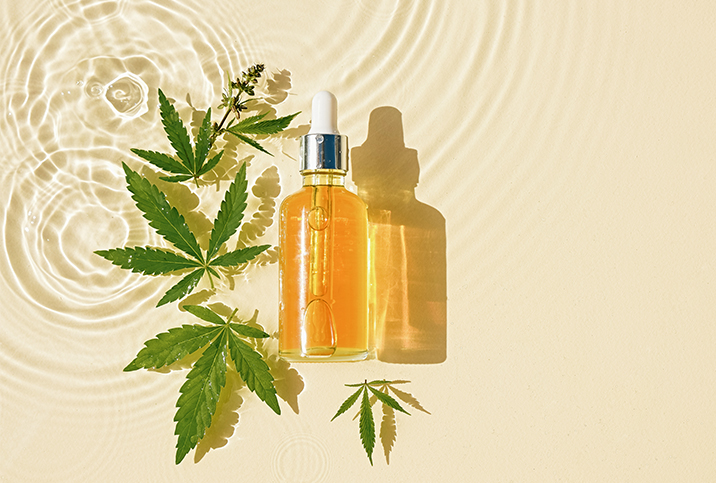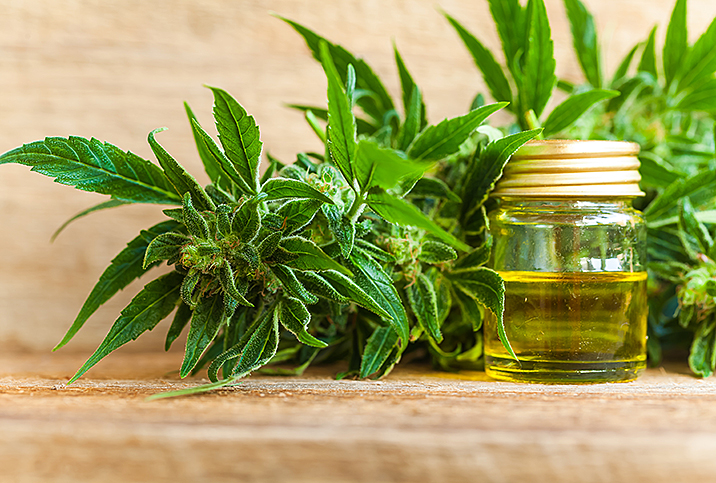Can CBD Relieve Menopause Symptoms?

Menopause is not a disorder, but a natural phenomenon brought about by hormonal changes that occur at the end of a person's reproductive period. However, its symptoms can substantially impact a person's health and well-being, prompting many individuals to seek treatment.
Hormone replacement therapy (HRT), also known as menopausal hormone therapy (MHT), is the most effective and well-researched treatment, but homeopathic remedies, such as maca and valerian, are also popular.
Cannabidiol (CBD), a chemical compound in cannabis without psychoactive properties, has become particularly popular since it was legalized in the United States as part of the 2018 Farm Bill. CBD may help alleviate some of the more troublesome side effects of menopause—though more research is needed.
Here we discuss what's known so far about how CBD can be used during the menopausal transition.
Menopause causes and symptoms
Most people with ovaries enter natural menopause in midlife when the ovaries stop producing reproductive hormones, including estrogen and progesterone, and periods cease. This typically occurs around age 50, though "the change"—and those telltale symptoms—can begin much earlier or later.
People taking hormonal suppressants or who have had an oophorectomy (removal of the ovaries) experience menopause as well, though this is chemically or surgically induced.
"Menopause is the end of your reproductive life. You are born with so many eggs, and when you run out, that is menopause," said Tara Scott, M.D., an Ohio-based functional and integrative physician and founder of Revitalize, a women's health provider. "Around menopause, levels of estrogen and progesterone fluctuate, causing symptoms. Estradiol can swing from high to low due to the increased FSH [follice-stimulating hormone], a signal from the brain to ovulate."
Symptoms typically begin during perimenopause, also called the menopausal transition. This is the period preceding menopause in which hormone levels begin to fluctuate. This stage typically occurs within five years before the final menstrual cycle. During this period, estrogen levels decrease by as much as 90 percent.
Symptoms vary in type and severity from one person to another but can include:
- Irregular periods
- Vaginal dryness
- Hot flashes
- Night sweats
- Difficulty sleeping
- Chills
- Recurrent urinary tract infections (UTIs)
- Weight gain
- Thinning hair
- Joint stiffness and pain
- Mood changes
- Difficulty concentrating
In the long term, menopause is also associated with loss of bone density and increased risk of osteoporosis and cardiovascular disease.
"Most menopausal symptoms are due to estrogen deficiency. Estrogen has many vital functions for the female body. When estrogen is low or absent, life can become very unpleasant," said Deborah Lee, M.B.Ch.B., D.R.C.O.G., a sexual and reproductive health specialist with Dr. Fox Pharmacy, an online clinic headquartered in Bristol, England.
How CBD works
CBD is one of several cannabinoids, along with tetrahydrocannabinol (THC), found in the cannabis plant. Although THC is psychoactive, producing marijuana's characteristic "high," CBD is not. Some "full-spectrum" CBD products contain THC and various other cannabis-derived cannabinoids. However, none have a THC content exceeding 0.3 percent, meaning they will not produce a high, even in large doses.
CBD products can be bought in several forms, including oil, capsules and edibles that are taken orally, and topical creams and lotions that are absorbed into the skin. Depending on your symptoms, one form may be more effective than another.
The human body also contains cannabinoids, known as endocannabinoids, as well as receptors and enzymes. Together, these make up the endocannabinoid system (ECS).
"The endocannabinoid system is widespread through the entirety of the central nervous system and peripheral regions. Like the sex steroid hormones, the endocannabinoid system regulates many physiological functions and behaviors," said Brynna Connor, M.D., healthcare ambassador at NorthWestPharmacy.com, an online pharmacy headquartered in the Seattle area.
Specifically, the ECS regulates and controls processes and functions including emotional processing, sleep, pain control, inflammatory and immune response, intercellular communication, fertility and reproduction, appetite and metabolism, and learning and memory.
"Cannabinoids, most commonly CBD and THC…bind with cannabinoid receptors in the endocannabinoid system, which has been shown to have many beneficial effects," Connor said. "Currently available studies suggest that the binding of CBD and other cannabinoids with the CB1 and CB2 receptors of the endocannabinoid system may be one of the sources of these beneficial effects for various reasons, many still not fully understood."
What symptoms might CBD alleviate?
To date, there have been no reliable studies explicitly evaluating the use of CBD for menopause relief, and its effect on menopausal people is uncertain. However, anecdotal and preliminary evidence indicates it may be beneficial.
"Anecdotal reports from my patients have been that CBD helps with anxiety, sleep disorders, and pain associated with menopausal symptoms," Scott said.
There is also evidence of CBD's therapeutic efficacy in treating other specific conditions, some of which co-occur with the menopausal transition.
Mood changes
Mood swings and increased susceptibility to stress, anxiety and depression occur primarily because estrogen and progesterone affect the activity of neurotransmitters, including serotonin, the "happy hormone." As hormone levels fluctuate, so does a person's neurochemistry.
CBD may help by activating serotonin receptors, thereby increasing serotonin availability. It also reduces levels of cortisol, the primary stress hormone, thus, assuaging stress and anxiety.
"The endocannabinoid system, among many other things, regulates emotion, stress, memory and cognition," Connor explained. "Because CBD has a beneficial effect on the ECS, this can help your body with this regulation, alleviating some of the common symptoms of menopause like insomnia and mood changes."
Joint stiffness and pain
Joint stiffness and pain can be partly attributable to age, but decreased estrogen is a factor, too. Lack of estrogen leads to increased production of tumor necrosis factor (TNFα), a pro-inflammatory molecule. For people with arthritis and other inflammatory conditions, this can exacerbate symptoms.
CBD has anti-inflammatory properties, and studies in mice have shown it can reduce arthritis-related inflammation. These studies also suggest CBD may protect joints against inflammatory damage caused by the disease.
In addition, CBD increases the level of anandamide, a neurotransmitter associated with reduced pain perception. Anandamide also helps regulate sleep and appetite, and enhances pleasure and motivation.
Hot flashes and night sweats
Hot flashes (or flushes) are frequent fodder for jokes, but they're no laughing matter. A hot flash is an intense and sudden feeling of warmth in the upper body, specifically the face, neck and chest. When hot flashes occur during sleep, they're called night sweats.
"Why hot flushes occur is still not well understood. However, they are thought to be due to changes in levels of various neurotransmitters in the brain," Lee said.
Research indicates that during a hot flash, the skin's temperature can rise as much as 5 to 7 degrees Fahrenheit due to the blood rushing into the vessels, though the body's core temperature does not normally increase.
Altered hypothalamus neurochemistry, specifically, decreased serotonin levels, causes the body's blood vessel dilation and sweat response to become hyperactive. For this reason, selective serotonin reuptake inhibitors (SSRIs), commonly prescribed for depression, are also prescribed to alleviate hot flashes, Lee said.
"CBD might help hot flushes as it has been shown to raise serotonin levels," Lee added.
Sleep disturbances
Many people going through perimenopause or menopause have difficulty sleeping due to pain, stress, anxiety and night sweats. By diminishing these symptoms and increasing levels of anandamide, CBD may facilitate a better night's sleep.
Preliminary evidence also suggests CBD might help with sleep disorders such as insomnia, REM sleep behavior disorder and excessive daytime sleepiness.
Vaginal and bladder symptoms
Estrogen affects blood flow to the pelvic region, so many menopausal people experience symptoms in the urinary tract and vagina, known as genitourinary syndrome.
"Estrogen causes the cells of the vaginal epithelium [skin] to remain plump and healthy, and to produce vaginal secretions for natural lubrication. Without estrogen, the vaginal epithelium becomes atrophic [shrinks] and produces fewer natural secretions, so the vagina feels dry," Lee said. "The tissue is more easily traumatized during sexual intercourse. This, and the lack of natural lubrication, can make sex painful."
CBD is a vasodilator, meaning it can stimulate blood flow. It's also a muscle relaxant with antioxidant and anti-inflammatory properties, Lee explained. These attributes combined may lend potential benefits, including increasing vaginal lubrication and elasticity, and reducing pain.
As with any new medication or supplement, it's important to talk to your physician first if you are thinking about adding CBD to your regimen. Your doctor can help advise you on options to address your specific symptoms, possible side effects and the proper dosage for your needs.
Editor's note: These statements have not been evaluated by the Food and Drug Administration. Our medical experts advise that you consult with your primary healthcare provider before you begin using a supplement. This information is not intended to diagnose, treat, cure or prevent disease.


















